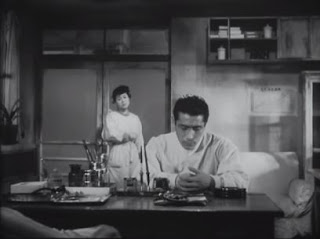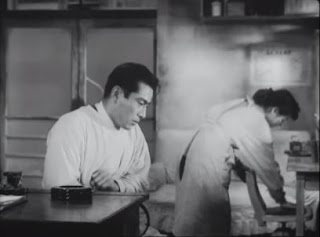Easy for him to say: he's a philosophy-educated, entitled prince with his future laid out for him, who's probably never missed a meal, never been snubbed and has a 24-hour-a-day entourage indulging his every whim. He's had it "good." Now, his Dad is dead and he's been tasked with avenging his death—by a spirit who claims to be his Father—at the hands of the current King, who is also his step-Father. Of course, he hates the guy—that makes it easier—but, still, he has to "do" something about it and nothing good.
And the consequences. The consequences. This is big stuff, not like fiddling about with Ophelia. He might be considering the results of his actions for the first time in his life. And he's scared. Scared to the point of not doing anything. "Thus conscience doth make cowards of us all." It certainly could make us crazy enough we end up talking to ourselves.
The Quiet Duel, directed by Akira Kurosawa, has a moment when the titular conflict is very un-quiet. Toshiro Mifune's Dr. Fujisaki—idealistic, stoic—who had broken off his engagement with his fiancée, due to his contracting syphilis during the war, has just learned that she is marrying another man. He has done this for her protection, but not given her the reason why. The combination of shame and loss eats away at him, until he confides with the one person who knows his secret and has just learned that he has made the sacrifice for his loved one.
The nurse has started out very cavalierly in her job, forced on her by society, and slowly, given the circumstances, and her witnessing of the doctor's pain, she is becoming more dedicated and less selfish. But, it's a hard lesson to learn, only made more understandable by the doctor's quiet duel between conscience and desire.
He has taken on the mantle of martyr due to his responsibilities as a doctor and his own moral conscience, but it is tough and he has made a sacrifice of the one thing that sustained him through the war. And his idealism and love has made him do it.
Doesn't mean he isn't bitter about it. And in this scene, that welled-up bitterness explodes in a flood of self-pity and frustration (that Kurosawa filmed in pretty much one shot). He has "done the right thing" but at the cost of his happiness. That sort of sacrifice would make a coward of anybody.
But, maybe he was chosen for this responsibility. Later, in the film his doctor-father—finding out the truth—will reflect "If he had been happy, he might have become just a snob."
Maybe. But, he wouldn't have done the right thing, tested in the crucible. He wouldn't have been a better man.
The Set-Up: Dr. Kyoji Fujisaki (Toshirô Mifune) has a life-affecting incident during the war. On a stormy night, tending a severely wounded soldier, he scratches a finger on a scalpel, breaking the skin, but continues with the critical operation. He learns later that the soldier has syphilis, and he's been infected himself. After the war, he keeps it a secret, treating himself, but breaks off his long engagement with his fiancée (Miki Sanjô) for fear of infecting her and, god forbid, any children they might have. His only confidante is nurse Rui Minegishi (Noriko Sengoku), a disgraced unwed mother, relegated to serving as a nursing assistant, who learned of the doctor's condition by subterfuge and noticing a change in supplies. After the break-up of the engagement, nurse Minegishi presses the point.
MISS MINEGISHI: Do you want your injection?
DR. KYOJI FUJISAKI: Yes.
MISS MINEGISHI: Miss Imai used to say to me she didn't understand why you didn't act like other men.
MISS MINEGISHI: She said even if you weren't getting married to her, it was impossible to control your desire forever.
DR. FUJISAKI: There are two kinds of patients, right? Some scream in pain. Others put up with pain dripping in sweat.
DR. FUJISAKI: Today, I found out she is to be the wife of some other guy. I thought I could give up everything.
[He walks over to the window]
DR. FUJISAKI: I'm fighting desperately now to curb my desires.
DR. FUJISAKI: Young and fastidious before the war, I suppressed it...to pretend I was a decent man.
DR. FUJISAKI: But one day, without having fooled around myself, my blood was contaminated by a shameless man's diseased blood! My body became dirty without knowing pleasure.
DR. FUJISAKI: If I'd known it would happen... it makes me think sometimes! I would do things differently.
[He turns towards Rui]
[He begins to cry]
DR. FUJISAKI: But...I have this conscience. I have this moral conscience. My conscience tries to crush out my physical desires. My conscience is killing my desires!
DR. FUJISAKI: I want to destroy this conscience and live as my desire wishes! That's honest as a human, right?
DR. FUJISAKI: Misao is a woman with a future. She has a body with a future. I've been longing to have that body for six years.
Words by Senkichi Taniguchi and Akira Kurosawa
Pictures by Sôichi Aisaka and Akira Kurosawa
The Quiet Duel is available on DVD from BCI/Eclipse. It also appears on YouTube.
Today's scene appears at 01:11:42





























































No comments:
Post a Comment